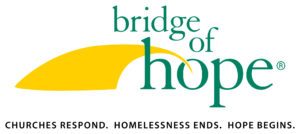
Cultural Humility: A Bridge of Hope Core Value
In January 2021, Bridge of Hope’s board of directors re-committed to our original 3 core values (Following Jesus, Embracing the Church and Choosing Hope) and added a new value of Practicing Cultural Humility as follows.
Practicing Cultural Humility
- We practice cultural humility because our faith teaches us that everyone is our neighbor, equally valued and beloved by God.
- We practice cultural humility as the primary tool for advocating alongside those experiencing social injustices that perpetuate homelessness, including racism, sexism, and poverty.
- We practice cultural humility by equipping all who are involved with Bridge of Hope to grow and develop a deep understanding and utilization of the three tenets of cultural humility: life-long learning and critical self-reflection, recognizing and challenging power imbalances, and creating institutional accountability.
- We practice cultural humility by committing ourselves to becoming a network of staff, board, Neighboring Volunteers and supporters that represents the diversity of the kingdom of God.
At Bridge of Hope, we are committed to a journey of Cultural Humility. In 2015, the board of directors of Bridge of Hope National appointed a Cultural Humility Task Force. Cultural Humility is now deeply embedded in our current strategic plan (2020-2023). With the addition of this fourth value, we recommit ourselves to this work of cultural humility and encourage our Bridge of Hope locations, neighboring volunteers, staff, board, and supporters to walk this journey alongside us so that we may learn together and hold each other accountable.
The three principles of Cultural Humility are:
- Commit to lifelong learning and critical self-reflection
- Recognize and change power imbalances for respectful relationships
- Create institutional accountability
Commitment to Lifelong Learning and Critical Self-Reflection
As a board, we have committed a significant portion of our meeting times to reading, watching, conversing and learning together from a variety of resources on social and economic justice issues related to issues of homelessness and housing in America. We have particularly focused on race as a social construct, racism in the church, housing discrimination and other societal factors that directly and indirectly impact homelessness. We invite you to join us in this conversation and to share the resources you find helpful.
Recognizing and Challenging Power Imbalances for Respectful Relationships
We commit to build partnerships that promote respect and economic and social justice. To fully engage with our neighbors, we must recognize that who we are impacts the way we show up. Whether because of our race, our gender, our class, or a myriad of other factors, some of us hold privileges that create imbalances in who has power and who has access to power. As we seek to walk together as neighbors in ending homelessness, it is essential to recognize the ways in which power imbalances impact our ability to truly connect with each other. The Neighboring Volunteer training developed in 2017 includes a significant focus on cultural humility. This posture invites others to teach us, and empowers others to speak their own story and to create their own future.
Institutional Accountability
Perhaps the most important tenet of Cultural Humility for a national body such as Bridge of Hope is the ability to be transparent in our aim to hold ourselves accountable to those we serve. While it is necessary and important to examine and work to change the various systems that lead to disproportionalities in who becomes homeless, we must also ensure that we are not also contributing to inequitable outcomes. Do the families we serve match the population of families experiencing homelessness? Are people of different races served equally and equitably in our network? Is our staff and board representative of the diversity of our communities and the people we serve?
In this regard, Bridge of Hope is intentionally striving to weave Cultural Humility into every critical area identified in our newly adopted strategic plan. We are committing to actionable, measurable goals to live out Cultural Humility and we seek to equip Bridge of Hope locations across the country with tools to promote racial and social equity in their services.
Our commitment and invitation:
As a national board, we recognize that there is much work to be done to get to the place that we desire to be on this journey. We take heart in being able to say that Bridge of Hope’s commitment to Cultural Humility is both ongoing and purposeful.
We commit to this work, and invite others to come to the table for this conversation. We pledge to continue learning, self-reflecting, challenging power imbalances, and creating organizational accountability.
8/9/2021
